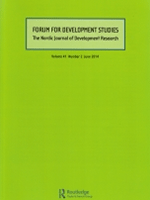Author
Mariel Aguilar-Støen
Abstract
Land grabbing in Central America is driven primarily by agro-industries and mining. Tourism development and infrastructure are also important forces behind new processes of land acquisition. Examining land grabbing in Central America allows us to move beyond single-cause explanations of land grabs and shows that it is a complicated and multi-actor process occurring at many scales. Contemporary processes of land acquisition and land re-concentration in Central America are embedded in a historical continuum of indigenous dispossession by colonial powers, later by international corporations and more recently by a combination of domestic and international capital in which the domestic landed elites play an important role. Even when the size of scale of land acquisitions is smaller compared with other parts of the world, new processes of land deals in Central America impact thousands of peasant livelihoods. These impacts are related both to changing property to land and to grabbing control over resources with implications for among other things, food security, human health, employment conditions and taxes, resulting in violent agrarian conflicts. Future research on land grabbing in Central America should focus on how drug trafficking interacts with land deals, the role of domestic elites in mining deals, the legal, illegal and quasi-legal instances in which the State operates in alliance with corporations, private security forces and the military.
